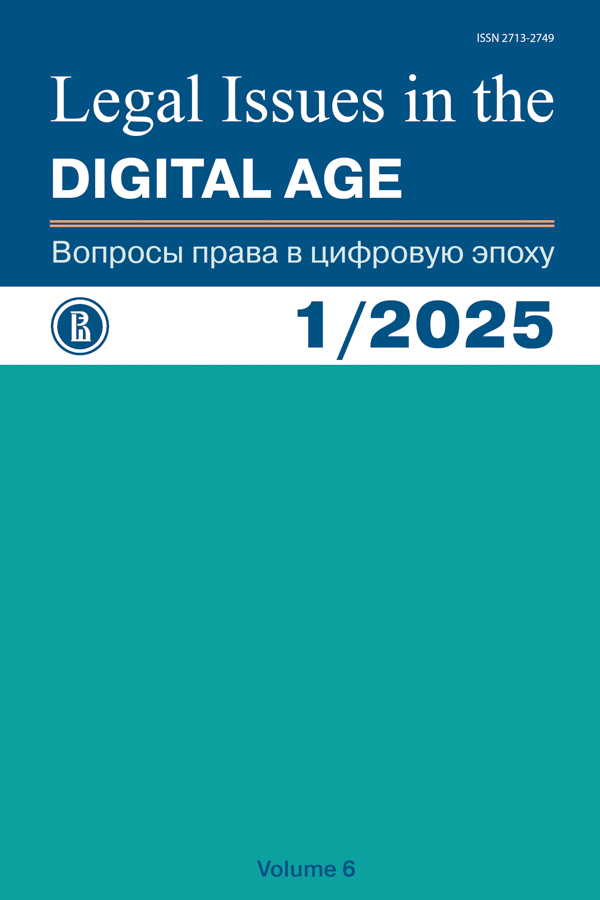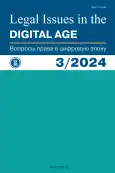Obligations in the Digital Environment: Legal Doctrine
- Авторы: Adelshin R.1
-
Учреждения:
- Russian State University of Justice
- Выпуск: Том 5, № 3 (2024)
- Страницы: 4-30
- Раздел: Цифровая эпоха: гражданское право
- URL: https://bakhtiniada.ru/2713-2749/article/view/292797
- DOI: https://doi.org/10.17323/2713-2749.2024.3.4.30
- ID: 292797
Цитировать
Полный текст
Аннотация
Ключевые слова
Об авторах
R. Adelshin
Russian State University of Justice
Автор, ответственный за переписку.
Email: adelshinrn@rsuj.ru
ORCID iD: 0000-0003-3724-7034
Список литературы
- Akhmedov A.Ya., Volos A.A., Volos E.P. (2022) Concept of Regulation of Relations Complicated by the Use of Smart Contracts. Moscow: Prospekt, p. 20, 79 (in Russ.)
- Belov V.A. (2007) Object of Subjective Civil Legal Relationship and Object of Civil Circulation: Content and Correlation of Concepts. In: Objects of Civil Circulation: collection of papers. M.A. Rozhkova (ed.). Moscow: Statut, p. 75 (in Russ.)
- Bogdanov D.E. (2023) Failed Technological Revolution in Contract Law: Apologetics of Traditionalist Interpretation of Contract. Lex Russica, no. 3, p. 35 (in Russ.)
- Bogdanova E.E. (2019) Smart Contract Application in Virtual Property Transactions. Lex Russica, no. 7, pp. 108–118 (in Russ.)
- Bychkov A. (2019) What Information Intermediaries are Responsible for. New Accounting, no. 7, pp. 116–131 (in Russ.)
- Chelyshev M.Y. (2009) Fundamentals of the Doctrine of Inter-sector Relations of Civil Law. Kazan: Kazan State University, p. 5, 197 (in Russ.)
- Efimov A.V. (2022) Functional Approach to the Construction of Civil and Business Law Norms. State and Law, no. 6, pp. 89–96 (in Russ.)
- Efimova L.G., Sizemova O.B. (2019) Legal Nature of Smart Contract. Banking Law, no. 1, pp. 23–30 (in Russ.)
- Egorova M.A., Kozhevina O.V. (2020) Place of Crypto currency in the System of Civil Rights Objects. Current Issues of Russian Law, no. 1, p. 83 (in Russ.)
- Fillipova S.Y. (2013) Instrumental Approach in the Science of Private Law. Moscow: Statut, p. 350 (in Russ.)
- Fomina O.N. (2019) Legal Status of Information Intermediary. Civil Law Bulletin, no. 3, pp. 171–191 (in Russ.)
- Grin O.S. et al. (2019) Legal Construct of Smart Contract: Legal Nature and Scope of Application. Lex Russica, no. 8, pp. 55–56 (in Russ.)
- Hohfeld W.N. (1917) Fundamental Legal Conceptions as Applied in Judicial Reasoning. Yale Law Journal, vol. 26, no. 8, pp. 710–770.
- Huang Y., Lu X. (2019) Intermediary Liability for Intellectual Property Infringement in China’s E-commerce Marketplaces. Asian Journal of Law and Society, vol. 7, no. 2, pp. 213–237.
- Jankowski R.M. (2017) The State and Crypto Currencies: Issues of Regulation. Available at: URL: http://msu.edu.ru/papers/yankovskiy/blockchain.pdf (in Russ.) (accessed: 30.06. 2024)
- Jünemann M., Milkau U. (2021) Can Code Be Law? Available at: https://digitalbusiness.law/2021/08/can-code-be-law/ (accessed: 26.12. 2023)
- Karnushin V.E. (2016) Secondary Rights in the Civil Law of the Russian Federation. In: General Issues of Theory. Secondary Rights. V.P. Kamyshanski (ed.). Moscow: Statut, p. 112 (in Russ.)
- Kartskhia A.A. (2019) Digital Transformation of Law. Monitoring of Law Enforcement, no. 1, p. 13 (in Russ.)
- Kiviat T. (2015) Beyond Bitcoin: Issues in Regulating Blockchain Transactions. Duke Law Journal, vol. 65, no. 3, pp. 569–608.
- Kotsar Yu.A. (2024) Smart Contract as a Form of Execution of Obligation with Conditional Performance. Law and State: Theory and Practice, no. 5, p. 46 (in Russ.)
- Kulakov V.V. (2017) Reasonable Balance of Interests of Participants of Civil Legal Relations: methodological issues of integration of different legal understanding. In: Methodological Issues of Civil Studies. Collection of papers. A.V. Gabov, V.G. Golubtsov (eds.). Issue 2. Moscow: Norma, p. 11 (in Russ.)
- Željka M. (2021) Smart Contract and Traditional Contract. In: Legal Tech Book. The Legal Technology Handbook. N.Y.: Wiley, pp. 165–166.
- Pokrovskaya A.V. (2024) Liability of Intermediaries for Copyright Infringement on Marketplaces: Study of China’s Experience. Journal of the Court of Intellectual Property Rights, no. 6, pp. 14–18 (in Russ.)
- Inderst R., Thomas S. (2024) Algorithms and Antitrust: A Framework with Special Emphasis on Coordinated Pricing.
- Sarbash S.V. (2005) Execution of a Contractual Obligation. Moscow: Statut, p. 532 (in Russ.)
- Savelyev A.I. (2016) Contract Law 2.0: Smart Contracts as the Beginning of the End of Classical Contract Law. Civil Law Bulletin, no. 3, pp. 32–59 (in Russ.)
- Sazhenov A.V. (2018) Cryptocurrencies: Dematerialisation of the Category of Things in Civil Law. Statut, no. 9, pp. 118–119 (in Russ.)
- Schumpeter J.A. (1995) Capitalism, Socialism and Democracy. Moscow: Ekonomika, p. 57 (in Russ.)
- Sukhanov E.A. (2011) Russian Civil Law. Law of Obligations: Textbook. Moscow: Statut, 1216 pp. (in Russ.)
- Tereshchenko L.K., Tiunov O.I. (2016) Information Intermediaries in Russian Law. Journal of Foreign Legislation and Comparative Law, no. 6, pp. 46–51 (in Russ.)
- Tereshchenko L.K., Starodubova O.E. (2017) Riddles of Information Law. Journal of Russian Law, no. 7, pp. 56–68 (in Russ.)
- Venediktov A.V. (1954) The System of the Soviet Civil Code. Soviet State and Law, no. 2, p. 29 (in Russ.)
- Volynkina M. (2012) The Content of the Exclusive Right: Theoretical Aspect. Copyright and Related Rights, no. 1, p. 5 (in Russ.)
- Zakharkina A.V. (2013) The Concept of Optional Obligation in the History of Civil Thought. Bulletin of Perm State University. Legal Sciences, no. 4, pp. 170–176 (in Russ.)
Дополнительные файлы










